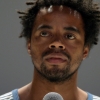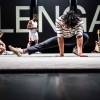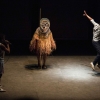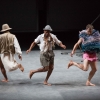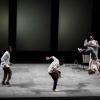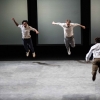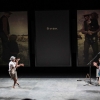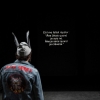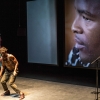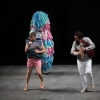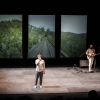LENGA
LENGA is a form which unites on stage a South African Xhosa acrobat/actor/singer/dancer who grew up in the Townships of Cape Town; a Merina dancer from Madagascar who was trained in the streets of Antananarivo and performs ritual exhumation ceremonies; a dancer/acrobat/actor from Gensac-sur-Garonne, France who is fond of his farming neighbourhood and an Occitan multi-instrumentalist keen on the concept of continuum between “tradition” and “contemporaneity” to the point he even questions the very fact of keeping each notion apart.
Together, the four performers utter words and embody fragments of languages, cultures and dynamic natures. In the flesh of their acting and on the verge of abandon, these performers express themselves freely on stage through the virtuoso challenge of their bodies. They offer a physical and gestural epic of visible, danced and plural idioms that relate to the necessary resistance and transmission of a “biolinguistic diversity”...a joyful one, in spite of the shadow that is drawing near. While languages and the ecology of practices and natures are running dry and turned into a story of translations between bodies, LENGA utters one word through various idioms and art forms: “different”.
On stage, this story of belongingness is peppered with video footage/film excerpts in which, as their grandsons are dancing, the actors' grandmothers—filmed in South Africa and Madagascar—underline, in Xhosa and Merina, the challenge of linguistic and cultural transmission. At the heart of their singularities and of History—Apartheid, environmental disasters, slavery, freedoms, economic dominations—the portrait of a missing ascendant, the extreme frailty of cultural legacies and the abandonment of one's language—forced and/or chosen and sometimes foreshadowing the destruction of yet another part of humanity—implicitly appear on screen.
While human diversity, languages and the ecology of practices and natures are running dry, LENGA offers a story of translations between bodies and utters one word through various idioms and art forms: “different”.

